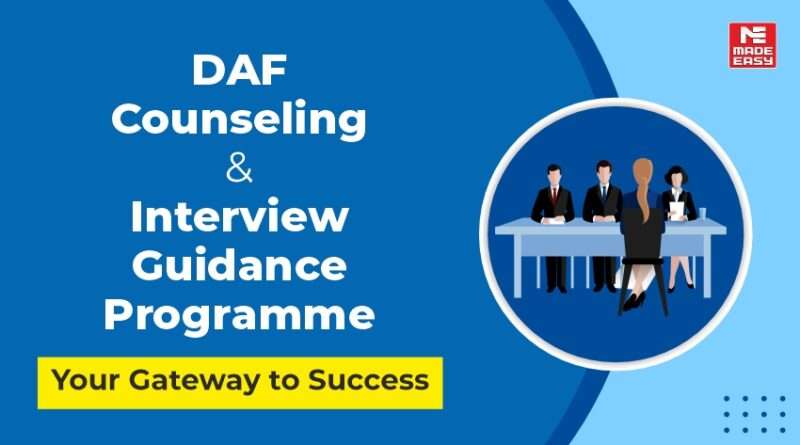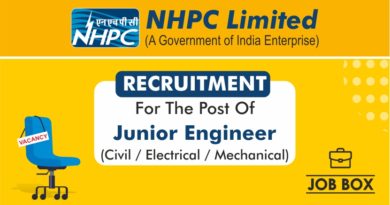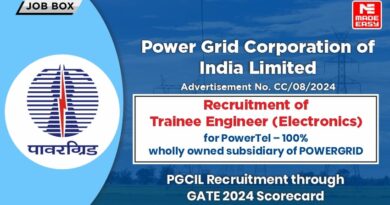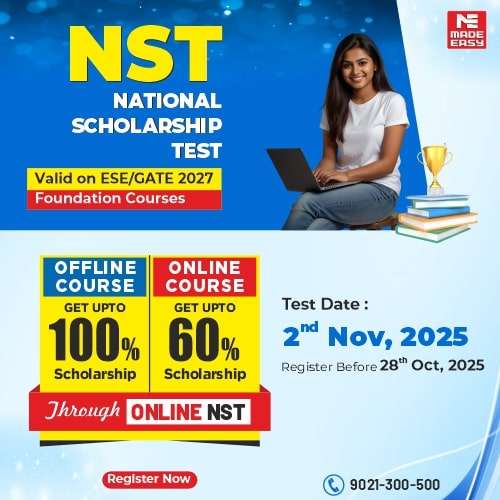ESE 2025: DAF Counseling and Interview Guidance Programme Sessions
UPSC ESE Main 2025 results were announced on 4th September 2025. MADE EASY wishes heartiest congratulations to all the selected candidates. After conquering 2 stages of the Engineering Services Examination, it’s time to hit the third and final stage, the interview or personality test. To go ahead for the third one, the prerequisite is your DAF—Detailed Application Form.
“Your days of homework and hard work will be judged in approx. 20-30 mins of interview’’
What is DAF in UPSC?
The Detailed Application Form, popularly known as the DAF form, is a crucial part of the process of enrolling in the UPSC exam. Candidates who have successfully qualified for the interview stage of the Engineering Services examination (ESE) are required to fill out this form. DAF is not only required in ESE interview, rather every Grade A services which recruit through UPSC requires DAF be it, CSE (Civil Services Examination), IFS (Indian Forest Services), CAPF (Central Armed Police Force) or any other service.
The online Detailed Application Form is available on the website www.upsc.gov.in. Candidates must visit the website and follow the specified guidelines to complete the application process.
The official dates for the submission of the Detailed Application form for the Engineering Services Exam 2025 have not been announced yet by UPSC.
How to fill the DAF for UPSC Exam?
Before understanding the steps followed to fill out the detailed application form, let’s know the two segments involved in the counselling interview round. This mainly includes DAF-based questions and non-DAF-based questions. The DAF segment mainly includes the information that forms the base of the interview, like personal information, parental information, educational information, employment information, service preference, extracurricular activities, prizes/medals and scholarships, NCC/games and sports, hobbies, interests, degree project/M.Tech project, job profile, native place, and other miscellaneous topics.
The non-DAF segment mainly includes an application that involves filling up information related to technical subjects and the candidate’s job profile. Generally topics like current affairs/ICT/environment, general science, general and social engineering, engineering in the news, engineering applications in various departments, the definition of various technical subjects, principle and fundamental concepts, technical applications, favourite and core subjects, subjects of M.Tech/job-related subjects, and other miscellaneous topics come under Non-DAF questions.
Usually, 20%-30% questions are asked from the DAF segment and 70%-80% questions are asked from the non-DAF segment. However, this can vary according to board, candidate, years etc.
One of the salient points that candidates need to remember is that UPSC DAF includes six modules, such as personal details, educational information, parental details, employment information, uploading the required documents, and final submission of the Detailed Application Form. Now that we know the background of the interview process, let’s check out the guidelines related to the UPSC DAF filling process.
Here are the guidelines that must be followed at the time of filling up the DAF form.
- Candidates must check if they have qualified for the written part of the examination. Qualifying in this round makes the candidate eligible to fill the form for the interview round.
- To get started, candidates must click on the link present below the ‘login’ button. This will take the candidate to the registration page.
- Candidates must fill in the required information at the time of registration. This includes Name, Roll Number, Date of Birth, and e-mail address.
- All the specified fields must be properly filled with the correct information as no changes are possible after the form is submitted.
- Candidates need to fill an active email address in the respective area as login credentials will be shared to the same email address after successful completion of registration via the Detailed Application Form.
- Next, candidates need to login into their login module with the credentials received over the registered email.
- It is important to note that candidates must fill all the modules properly while filling up the application form. The DAF form has the option of where candidates can make changes in the modules if required before the final submission.
- In case of any genuine errors occur, the candidate gets the opportunity to represent the Commission with the required documents. The Commission will make the final decision based on merit. This completes the UPSC DAF registration process.
DAF Counselling Session
Almost everyone who fills out a DAF has certain common questions popping up in their minds—how to make it more impressive?? What will be the order of preference for the departments? What to fill in the hobbies column??
As it is said, first impressions matter a lot—so
Before you appear on the seat in front of the interviewer’s desk,
They have your DAF on their desks, and
This DAF will create an impression of the person coming next.
Two simple words to follow when you fill these interrogating areas in your DAF are “Don’t Lie.” This is the document that will be the basis of your interview, so if you don’t know or you don’t have better, leave it blank.
The main areas that create confusion are service preference, prizes/medals/scholarships, team games/sports, position of distinction leadership, hobbies, and interests.
- In order to fill up the department preference, you must know basic information regarding different departments, nature of work, and job locations, and then accordingly you must decide your service preference. To lessen your task of research about all departments, MADE EASY is going to organize exclusive DAF sessions to help you out in framing your preference order very soon.
- The rest 5 areas are those areas that you cannot copy from anybody; these are the areas that are unique to an individual personality, like prizes/medals/scholarships, team games/sports, positions of distinction/leadership, hobbies, and interests. These are the areas that obviously will not lead to your rejection, but if you have them, then surely it will become a distinguishing factor between you and the person sitting next to you in the waiting section.
These are the areas where, when you write something, you should be extra cautious because questions will be put up in the interview. This has to be your profile, your prizes, and your areas of interest, and you must have basic knowledge about everything you mention on your DAF. For all the above-stated points, the DAF session will play a crucial role to guide you on what to fill.
Grooming for Personality Test
The interview should not be taken lightly; many students who are top scorers in the main exam are left far behind in the interview race.
The UPSC ESE interview panel consists of experts from various fields having wide experience in the technical section—maybe somewhere around 20-25 years. You may think you are technically strong, as you have cleared Main, but whatever you have learned until now is bookish knowledge; the interview panel members will grill you on practical application. They don’t want engineering students; rather, they are searching for techno-managerial personals to fit into the system of practical approach.
So to connect your learned book concepts with the practical application, you need guidance from experts who can train you well. Needless to say, MADE EASY has unmatchable expertise to mentor every qualified candidate to handle this sensitive area.
Usually the technical part of your current job (if you are employed) related questions will account for 70%-80% weightage in your interview. The rest may comprise the current affairs and HR part. However, there are no such fixed criteria for weightage.
For the Current Affairs and HR part, they may ask you why you want to join IES. Why is this department on the top of the list of preference orders? Why did you left your previous job and other current affairs related questions. Such questions can only be answered when you get proper training.
Remember, this is not the conventional paper where one of your answers goes wrong and can be covered in other questions. Every word counts in an interview, and one unsuitable word will take your interview in another direction. Then recovery during the entire interview time is not possible. Hence, if you don’t give suitable answers, your overall rank goes down irrespective of your main performance. This point makes it a must to have proper interview handling guidance, and that too from the best mentors.
MADE EASY has analyzed the UPSC pattern, which shows the track—where they emphasize and what type of questions they can ask and what answers they expect. Therefore, we are offering an exclusive Interview Guidance program for ESE Main qualified candidates, where the team of retired civil servants, experienced faculty, and personality grooming experts will guide the candidates in the best possible manner.
The Interview Guidance Course not only gives you strength in current affairs, HR, and technical areas but also focuses on improving your overall personality for the interview; from the point when you greet them till you say thank you, all eyes are on you, and you will be judged on your every action. You obviously cannot slouch or lean back in front of the interviewer. The ideal way to sit, the best dress for the day, the best way to greet the panel, and the best way to introduce yourself—such areas are also equally taken care of in the Interview Guidance Program.
To face this interview, apart from learning “HOW,” every engineer needs rigorous practice to implement the tips. Regular “MOCK INTERVIEWS” are useful in this aspect. MADE EASY organizes mock interviews simulating the UPSC environment with renowned and experienced panel members who are retired civil servants, professors, and personality grooming experts with wide experience. You can give mock interviews, implement the learned tips, get rid of the fear of interviews, and make your UPSC interview the best interview ever.
ESE 2025 Interview Guidance Program
Until now, candidates would have gotten some idea about the importance of interviews and interview guidance. As mentioned above, every year MADE EASY brings the MADE EASY Interview Guidance Program for ESE Mains qualified students. For ESE 2025, the MADE EASY interview guidance program is going to start on 13th September 2025.
There would be a total of 15 sessions, and these sessions would be conducted in live online mode on the MADE EASY app.
The sessions are divided as follows:
- DAF Guidance session: 1 session
- PD and HR session : 2 session
- Current Affairs session: 2 session
- Technical session: 10 session
Some important points that would be discussed in interview guidance sessions are:
- A very important session on “DAF Filling” to get proper guidance.
- Tips to face interview.
- Hobbies, interests, degree project, Extra & co-curricular activities etc.
- Discussion on current social, environmental, economic & other relevant topics.
- Discussion on previous interview questions.
- Discussion on application based & latest development in various technical areas.
DAF guidance session would be conducted by Mr B.Singh Sir (Ex. IES, CMD of MADE EASY and NEXT IAS). All the ESE Mains qualified students should attend this DAF guidance session to avoid any mistake.
Click here to view the complete schedule of interview guidance program
Candidates who would enrol in the interview guidance program can also appear in ESE mock interviews (2 Nos). These mock interview are free of cost for all ESE 2025 Mains qualified candidates. The schedule of mock interview would be announced soon. These mock interviews will be conducted in real time environment similar to that of UPSC by a panel of experts comprising former Civil Servants, Engineering Services Officers, Board Members, MADE EASY faculties & HR experts.
Fee Structure
The interview guidance program is free for MADE EASY students who are enrolled in the foundation batch/mains batch.
Those candidates who are enrolled in short-term courses/postal packages/test series or are non-MADE EASY students need to pay Rs 3000 for the interview guidance program.
However, those who would enroll in the interview guidance program before 20th September 2025 would get some discount in fees.
The discounted fee for students enrolled in short-term courses/postal packages/test series is Rs 500, whereas non-MADE EASY students would have to pay Rs 1000 only. This discounted fee is valid till 20th September 2025 only. For more details about the interview guidance program, schedule, mode of interview guidance program, timing, faculties, etc., candidates can visit here.
We extend our heartiest congratulations every ESE 2025 Mains qualified candidates. We wish all the best to every candidate for ESE 2025 interview.
Dear Aspirants,
Your preparation for GATE, ESE, PSUs, and AE/JE is now smarter than ever — thanks to the MADE EASY YouTube channel.
This is not just a channel, but a complete strategy for success, where you get toppers strategies, PYQ–GTQ discussions, current affairs updates, and important job-related information, all delivered by the country’s best teachers and industry experts.
If you also want to stay one step ahead in the race to success, subscribe to MADE EASY on YouTube and stay connected with us on social media.
MADE EASY — where preparation happens with confidence.
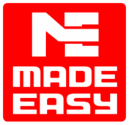
MADE EASY is a well-organized institute, complete in all aspects, and provides quality guidance for both written and personality tests. MADE EASY has produced top-ranked students in ESE, GATE, and various public sector exams. The publishing team regularly writes exam-related blogs based on conversations with the faculty, helping students prepare effectively for their exams.

